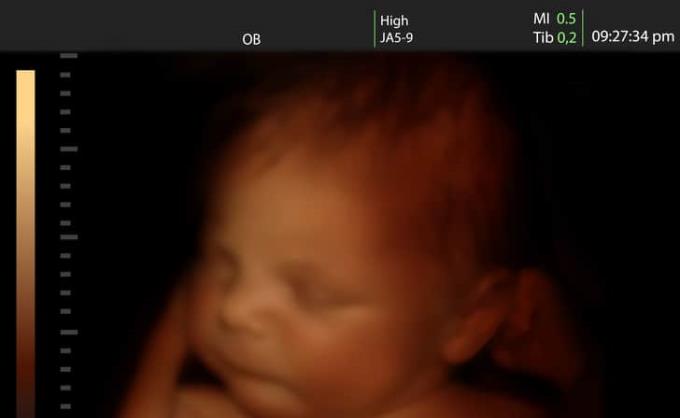The brain development of the fetus in the womb is very wonderful. Right from week 3, your baby's brain begins to form, develop and gradually perfect until the baby is born.
As parents, everyone wants their children born to be smart and healthy. Right from the time the baby was still in the womb, parents took care and carefully selected what is best for their baby so that the baby can develop comprehensively. However, there is one thing that most parents still do not fully understand about their little angel, which is the structure and activity of the baby's brain. Let aFamilyToday Health watch the following shares to learn more about this miracle.
Brain structure of the fetus
Just like the adult brain, a baby's brain is also divided into 5 different areas, each responsible for each specific function:
Hypothalamus: Control feelings of hunger, thirst, sleep, and emotions. Furthermore, this area is also responsible for maintaining body temperature.
Pituitary: Small in size like a pea, in charge of hormone production for the body. In addition, this area supports growth, metabolism and a number of other functions.
Brain stem: This is considered a fairly important part of the brain, helping to control the life of the body by controlling breathing activities, maintaining a stable heart rate and regulating blood pressure.
Cerebellum: All of your baby's kicks that you feel are the result of cerebellar activity. This part of the brain coordinates movement movements, maintains posture and creates a sense of balance.
Cerebrum: This is the largest part of the brain, responsible for thinking, remembering and feeling. The cerebrum is also a large part of the brain, containing several structures under the cerebral cortex, including the frontal and temporal lobes.
Brain development of fetus
Your baby's brain will begin to form from the 3rd week of pregnancy, then develop and gradually complete through different stages while still in the abdomen and after birth:
The first trimester
One week after conception, the neural foundation of the fetus begins to form, develop in length and fold. Then, they turn into a groove and gradually create a neural tube.
Around 6-7 weeks of pregnancy, the neural tube closes in a curved direction and is divided into three parts: the vestibule, the middle brain, and the posterior brain. The spinal cord will soon appear in the part adjacent to the posterior brain.
Then, fetal brain development also originates in the neural tube and divides it into 5 areas. However, all brain areas still take a long time to complete.
Also during this stage, a number of microscopic nerve cells move around the embryo to create the first nerves. At 8 weeks, the fetus can wiggle its limbs and begin to develop touch. By the end of the first trimester, the baby is already quite able to perform a lot of actions even though the mother is still unable to feel it.
The second trimester
During the second trimester, the brain plays a role in controlling regular contractions in the diaphragm and chest muscles, similar to breathing. At the same time, a protective layer that speeds up signal transmission between nerve cells, called myelin, will appear and surround your baby's nerves. Myelin will continue to develop until the baby is one year old.
By the end of the second trimester, a baby's brain stem is almost completely mature. At this time, the fetal nervous system has developed enough for the baby to startle if there is a loud noise outside or even turn his head toward the voice of a loved one.

Third trimester
At 28 weeks of pregnancy , the central nervous system can control rhythmic breathing and control body temperature. In particular, the baby's brainwave activity has appeared in the sleep cycle, including the dream phase.
At this stage, fetal brain weight also triples, from about 100g at the end of the second trimester to almost 300g.
The surface of the brain has more grooves and wrinkles, similar to the usual brain imaging.
Cerebellum surface area increased 30 times in just the last 16 weeks of pregnancy.
The cerebral cortex is still developing very quickly, but this area only starts to function when the baby is almost born. The cerebral cortex will continue to mature during the first few years of a baby's life thanks to the variety of environments in the outside world.
What to eat good for your baby's brain development?
For a healthy and intelligent baby, pregnant women need to immediately add to their diet foods that contain the following nutrients:
Zinc
This is a trace element that plays an important role in the brain development of the fetus in the early stages. Zinc has the effect of increasing the power of nerve cells and neurotransmitters. Foods high in zinc to add to your diet are red meat, kidney beans, walnuts, pumpkin seeds, and spinach.
The protein
Protein is an indispensable nutrient in pregnant diets. In particular, this is also an important factor for your baby's brain development. Specifically, protein works to enhance the function of brain cells and helps in overall healthy brain development. Protein-rich foods are eggs, legumes, fish and lean meats.
Iodine
Right from the prenatal period, doctors have reminded you to take an iodine supplement in preparation for pregnancy. Iodine plays an important role in the development of the spinal cord and connecting parts of the brain. Iodine deficiency in pregnant women can cause cognitive impairment and high risk of preterm birth . Foods rich in iodine are strawberries, seaweed, and yogurt.
Iron
Iron is a mineral that pregnant women should pay attention to to prevent preterm birth. Not only that, this nutrient is also essential for the child's nerve development.
How well the brain works is not very dependent on nerve cells capable of transmitting communication signals. Iron improves and enhances this ability of nerve cells. Iron-rich foods are usually spinach, raisins and lentils.
Choline
The fetal brain development is highly dependent on this nutrient. Choline helps to reduce the risk of babies developing neural tube defects as well as good for their memory and learning ability in the future.
Chicken, pork and potatoes are very rich in choline that you should add to your diet.
Folic acid
Folic acid supplementation is extremely important for pregnant women. Folic acid works to prevent neural tube defects in the fetus. Beets, avocados, orange juice and green vegetables are all foods rich in folic acid to include in your diet.

Factors harmful to fetal brain development
Here are some habits that can negatively affect your baby's brain development:
Contact with toxic substances
These chemicals can be present in many places, such as places with polluted air, or simply when you come into contact with newly purchased paint and furniture. Lead, arsenic, and mercury in new paints or furniture can all adversely affect children's brain development.
Rubella virus
Rubella, also known as German measles or three-day measles, is a contagious viral illness that is easily recognized by the characteristic red rash (spot or boil). Although rubella may not be harmful to the mother, it has certain effects on the fetus. If the mother has rubella disease in the early months of pregnancy, the baby may experience cataracts, deafness and even developmental delays.
Epilepsy medicine
Taking epilepsy medication during pregnancy can result in a baby born with a lower IQ.
Drink alcohol
When pregnant women drink alcohol, alcohol can cross the placenta and penetrate into the baby's body. This can lead to major damage to the baby's immature nervous system.
Less sun exposure
Pregnant women who stay indoors with little exposure to the sun are at risk of multiple sclerosis and the development of the nervous system is also hindered.
Stress
Stress is related to mental state and can make mothers feel less appetite and affect the nutrition of the fetus.
Medicine
During pregnancy, you absolutely do not take the medication on your own. Because even the most common medicines like aspirin or any other pain reliever can seriously affect the brain development of the fetus.
Lack of vitamin D
Vitamin D deficiency from other sources can lead to babies born with breathing problems as well as speech problems.
Lack of folic acid
Folic acid is an important nutrient that pregnant women should pay attention to every day. If folic acid is deficient, the baby will be at risk for many birth defects.
Preterm birth
Preterm birth can more or less affect the child's brain development because brain development takes place mostly in the mother's body.
Father's work
If the father's work is frequently exposed to harmful factors, the sperm will suffer and the baby may experience brain-related disorders.
Parent's age
A child conceived by a parent over 35-40 years old has a higher risk of developing a mental disorder.
Understanding fetal brain development is very interesting. During pregnancy, you need to be alert for suspicious symptoms to make sure your baby is always developing healthy.













